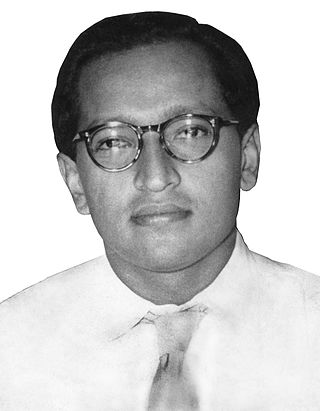
Nanayakkarapathirage Martin Perera, commonly known as Dr. N. M. Perera, was one of the leaders of the Sri Lankan Trotskyist Lanka Sama Samaja Party (LSSP). He was the first Trotskyist to become a cabinet minister. He served two terms as Minister of Finance and Leader of the Opposition, as well as one term as the Mayor of Colombo.

The Lanka Sama Samaja Party, often abbreviated as LSSP, is a major Trotskyist political party in Sri Lanka. It was the first political party in Sri Lanka, having been founded in 1935 by Leslie Goonewardene, N.M. Perera, Colvin R. de Silva, Philip Gunawardena and Robert Gunawardena. It currently is a member of the main ruling coalition in the government of Sri Lanka and is headed by Tissa Vitharana. The party was founded with Leninist ideals, and is classified as a party with socialist aims.

Anil Moonesinghe was a Sri Lankan Trotskyist revolutionary politician and trade unionist. He became a member of parliament, a Cabinet Minister of Transport in 1964, the Deputy Speaker of Parliament from 1994 to 2000 and a diplomat. He has authored several books and edited newspapers and magazines. He was chairman and general manager of a State corporation. He briefly held the honorary rank of colonel.
Jeanne Hoban, known after her marriage as Jeanne Moonesinghe, was a British Trotskyist who became active in trade unionism and politics in Sri Lanka. She was one of the handful of European Radicals in Sri Lanka.
Mark Anthony Lyster Bracegirdle was a British-born Australian Marxist revolutionary who played a key role in the Sri Lankan independence movement. He was one of the handful of European Radicals in Sri Lanka. He is most known for initiating the Bracegirdle Incident.
The Bolshevik Samasamaja Party was the Ceylon section Bolshevik-Leninist Party of India, Ceylon and Burma (BLPI) after 1945 and of the Fourth International in 1948-1950, after the dissolution of the BLPI.
The Ceylon Federation of Labour (CFL) is an organisation bringing together trade unions in the private, semi-government and co-operative sectors of Sri Lanka.

Don Carolis Hewavitharane Wijeyaguneratne (Sinhala: දොන් කරෝලිස් හේවාවිතාරණ)(1833 – 18 February 1906) was a Ceylonese businessman, industrialist, philanthropist and a pioneer of the Buddhist revival movement. He was the father of Anagarika Dharmapala, and founded a family of considerable influence.

Mangala Nath Moonesinghe was a Sri Lankan lawyer, politician and diplomat. He served as a Member of Parliament for Bulathsinhala electorate between 1965 and 1977, and the Kalutara electorate between 1989 and 1994. He was Sri Lankan High Commissioner to India from 1995 to 2000 and to the United Kingdom from 2000 to 2002.
Susil Moonesinghe was a Sri Lankan lawyer, politician, diplomat and former chairman of State Trading Wholesale Company Ltd. A former chief minister of the Western Provincial Council and a member of parliament, he was Sri Lankan Ambassador to Iran. The brother of Anil Moonesinghe and the son of Piyadas Moonesinghe, he was educated at the Royal College, Colombo.
The 1966 alleged Ceylonese coup d'état attempt was an alleged military coup planned in Sri Lanka (Ceylon). The commander of the army and several military personnel were arrested. They were later acquitted of a plot to overthrow the legally elected government.
The 10th Parliament of Sri Lanka was a meeting of the Parliament of Sri Lanka, with the membership determined by the results of the 1994 parliamentary election held on 16 August 1994. The parliament met for the first time on 25 August 1994 and was dissolved on 18 August 2000.
Wilfred Senanayake was a Sri Lankan politician who served as member of Parliament for Homagama.
The history of Sri Lanka Transport Board, the state-run, primary bus operator in Sri Lanka, goes back to 1 January 1958. The state-owned enterprise was at the time known as the Ceylon Transport Board. At its peak, it was the largest omnibus company in the world - with about 7,000 buses and over 50,000 employees. With privatization in 1979, it underwent a period of decline. First broken up into several regional boards, then into several companies, it was finally reconstituted as the Sri Lanka Transport Board in 2005.

Deshamanya Jayantha Kelegama (1928–2005) was a Sri Lankan economist and civil servant. He belongs to the first generation of economists in the post-independent Sri Lanka.

The deputy speaker and chairman of committees is a member of the Parliament of Sri Lanka who presides over sittings of Parliament in the absence of the Speaker. The current deputy speaker and chairman of committees is Ajith Rajapaksa.






